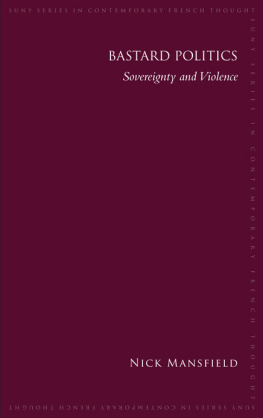C. Murphy - The Queen_s Bastard
Here you can read online C. Murphy - The Queen_s Bastard full text of the book (entire story) in english for free. Download pdf and epub, get meaning, cover and reviews about this ebook. genre: Romance novel. Description of the work, (preface) as well as reviews are available. Best literature library LitArk.com created for fans of good reading and offers a wide selection of genres:
Romance novel
Science fiction
Adventure
Detective
Science
History
Home and family
Prose
Art
Politics
Computer
Non-fiction
Religion
Business
Children
Humor
Choose a favorite category and find really read worthwhile books. Enjoy immersion in the world of imagination, feel the emotions of the characters or learn something new for yourself, make an fascinating discovery.

- Book:
- Author:
- Genre:
- Rating:3 / 5
- Favourites:Add to favourites
- Your mark:
- 60
- 1
- 2
- 3
- 4
- 5
: summary, description and annotation
We offer to read an annotation, description, summary or preface (depends on what the author of the book "" wrote himself). If you haven't found the necessary information about the book — write in the comments, we will try to find it.
: author's other books
Who wrote ? Find out the surname, the name of the author of the book and a list of all author's works by series.
— read online for free the complete book (whole text) full work
Below is the text of the book, divided by pages. System saving the place of the last page read, allows you to conveniently read the book "" online for free, without having to search again every time where you left off. Put a bookmark, and you can go to the page where you finished reading at any time.
Font size:
Interval:
Bookmark:
C. E Murphy
The Queen_s Bastard
SANDALIA DE PHILIP DE COSTA
12 OCTOBER 1561 Lanyarch, north of Aulun
She wears a sheepskin against the wind that shrieks around cathedral walls. The skin is soft and smells surprisingly good, and its creamy warmth seems a more fitting nod to wedding colours than the tartan blues and yellowed whites that the man at her side wears. Her gown beneath the sheepskin is sturdy, not fashionable; it has been made for travel. Indeed, shes come from the ship to the carriage and thence to this lonely, wind-whipped cathedral with no time to arrange herself as suits her station. She was told it would be thus, and if she feels disappointment, shes put it away in the name of duty.
Her hair is still damp and tangled from the wind that beats grey stone into submission and whips grey clouds into hungry, gaping scars across the sky. Rain clatters against stained glass until Mary, Mother of Christ, weeps with it. No shard of sunlight streams through to bring joy to her tears. Its said that rain on a wedding day is good luck, though that seems contrived; certainly no one claims sunshine is ill luck.
Voices murmur beneath the violent rain, echoing within bleak stone walls. Theyre critical, sympathetic, disdainful, sorrowful, curious, and above all without respect.
It is not done to whisper and comment during the marriage of one royal to another. After, yes, and before most certainly, but as a priests sonorous tones ring through the dismal cathedral there should be silence. Respect. Awe. Even when the wedding is done in haste, and with none of the pomp that might be expected, it should be an occasion for solemnity, not gossip. In time, those who chatter and mock will come to regret their loose tongues, for it will be made clear to them why their lands are forfeit; why their children are made involuntary guests; why a handful of heads roll and feet kick in the depths of serene dark forests.
But that is in time, and not a thought to be entertained on a wedding day.
Sandalia, aged fourteen years, sister to the prince of Essandia and soon to be queen of oppressed Lanyarch, lifts a warm brown gaze to the bishop who bestows her husbands name upon her, and smiles. Theyre done together, the marriage and the crowning. Rough Lanyarchan rubes clamour to make oaths to the aging king and his fresh bride. Hes old, too old, for a girl of her age, though he isnt yet feeble. What he is, is too wedded to his faith. Hes taken no wife until Sandalia, and thats done only under pressure from Rodrigo, Essandias ruling prince and Sandalias brother. Aulun, the sister country to Lanyarchs south, chokes under the Reformation Churchs hold, and Ecumenic Lanyarch suffers for it. Should Charles, last of the house of Stewart, pass without an heir, there will be no stopping the Red Bitch in Aulun from sweeping over Lanyarch and bending it to her rule.
Rodrigo, as in love with his faith as Charles but far more pragmatic, will not allow that to happen. Sandalia remembers his apology as they stood on an Essandian dock, in the moments before she climbed aboard a tall ship to sail north and meet her fate. In memory, he takes her hands in his, studying her with sad eyes. Rodrigo is twice her age, handsome and fit in the prime of his life, and he doesnt like sending a young sister away as a piece on a playing field. He murmurs words of sorrow, words that hang in Sandalias mind even now, for all that shes tried to forget them. She is a princess of Essandia, and did not, does not, will not, need the princes apologies: she is young, but she knows her duty, and would do anything for her brother besides.
So now, with the weight of a queens crown on her head, she turns from the man who crowned her and holds the hand of the one shes wed, and speaks in a clear strong voice and in a language that is not her own. People will admire her mastery of the Aulunian tongue now, and later say her speech held wisdom and charm beyond her years.
I stand before you now a queen, and beside my husband as protector of our faith. Lanyarch is like my child to me, and I will not see it fall beneath Reformation rule. I will be mother to this brave northern country and mother to its heir, standing beside my lord until God finds it fit to help us all shake off the law that has been so cruelly brought down upon us. I have received the blessing of our beloved church, but now I beg of you to share your own blessings of hearth and home with me. I come from a warm country far to the south. Let me now know the warmth that is Lanyarch!
All the voices that had babbled in contempt now rise in a furor, raw welcoming cheers and stamping feet, tartaned men sending ear-shattering whistles to drive back the sound of rain. They swear fealty, one after the other, while Charles stands at Sandalias side, distant and polite. He doesnt see the masses before him; his gaze is cast to the glorious stained glass windows that tell of Christs suffering. He thinks not of his countrys future, but of his own part in the King of Heavens tale.
Sandalia, her absent king at her side, rides the breadth and width of Lanyarch all through the winter, chapping her fine skin and accepting dark bread and ale as her nightly meals. She sleeps before the fire in common rooms and learns, poorly, to weave a tartan, but most of all she learns the laughter of the crude Lanyarchan people, and learns to share it.
In the springtime she retreats to the capital city of Agned, insisting she can hardly be expected to bear an heir when she and Charles spend their nights crowded into common rooms with little time to themselves. The people whistle and roar and share ribald winks, all of them more than half in love with the dusky princess from the south, and grant her privacy to tend to the serious business of making a child.
Fifteen months from their wedding date, Charless story ends in a phlegm-filled fit of coughing, leaving his wife without the rounded belly shes promised her people. Rumour whispers Charles has gone to the grave as godly and pure as he came from the womb, no woman ever breached by his sword.
Sandalia, queen of Lanyarch, belovd to her people and no longer protected by a husband whose claim to the throne is incontestable, gathers her skirts and flees her adopted northern land with the threat of the Titian Bitch at her back.
SANDALIA, QUEEN OF LANYARCH
17 October 1563 Gallin, northeast of Essandia
She wears a sheepskin, not against biting wind, but to remind her deserted country that she has not forgotten it. The skin doesnt suit a silver-shot gown encrusted with pearls, nor the mildness of the Gallic day; the sky lies against the horizon as pale and calm as it does directly overhead, autumns sunshine enough to make the day bright and delightful without blinding the youthful Lanyarchan queen.
She wears a sheepskin to remind the gathered throngs who call her name as she rides through Lutetian streets in a carriage behind six matched white horses that she does not come to their king merely a princess, but as a queen in her own right. A queen in exile, to be sure, but a queen loved by her people, and a queen whose faith supports her. She has forgone a crown; such an obvious symbol of power speaks of desperation, a crassness in announcing who she is. Sandalia needs not stoop so low.
But she wears the sheepskin, and no one who sees her on her wedding day will forget it.
She rides alone that day, and when the carriage stops before the cathedral entrance, it is her brother who steps forward to offer his hand. Rodrigo, who sent her north to Lanyarch as winter came on, and who made her a queen by doing so. He had not been there to see her crowned that day, and the softness in his eyes offered apology for that now, two years later, as she goes to make another match in the name of duty.
Font size:
Interval:
Bookmark:
Similar books «»
Look at similar books to . We have selected literature similar in name and meaning in the hope of providing readers with more options to find new, interesting, not yet read works.
Discussion, reviews of the book and just readers' own opinions. Leave your comments, write what you think about the work, its meaning or the main characters. Specify what exactly you liked and what you didn't like, and why you think so.











